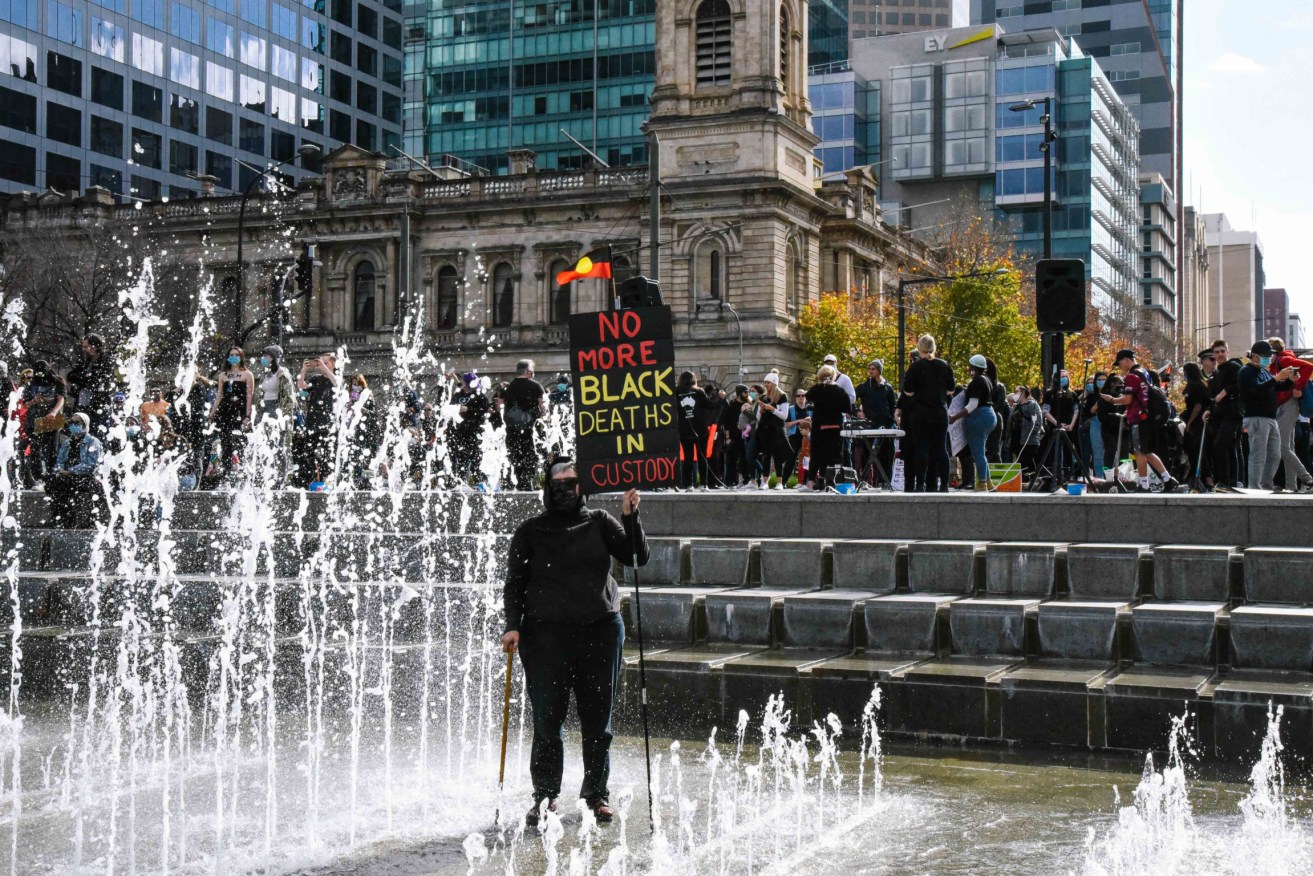SA Govt finally moves on 1991 recommendation to stop Aboriginal deaths in custody
SA Police officers will be forced to notify the state’s Aboriginal legal service every time an Indigenous person is detained in custody under regulations being proposed by the State Government – decades after it was recommended by the 1991 Australian Royal Commission into Aboriginal Deaths in Custody.

A protestor at the Black Lives Matter protest in Adelaide. Photo: Jack Fenby
Advocates say the “lifesaving” move will reduce the number of Aboriginal deaths in custody and send a “clear message” to police that they have a mandated responsibility to make a notification when an Aboriginal person is detained.
Aboriginal Legal Rights Movement (ALRM) claims in South Australia alone there were eight Aboriginal deaths in prison or in police custody between 2015 and 2018.
The organisation says some of those deaths were medical-related, but others required independent investigations.
Attorney-General Vickie Chapman this morning announced the State Government would introduce new regulations for a Custody Notification Service (CNS), which would legally require SA Police to telephone ALRM lawyers as soon as an Aboriginal person enters custody.
As part of the service, ALRM representatives would be allowed to speak to or visit the detained person, and discuss any concerns regarding their welfare, including whether they need an interpreter or a support person.
Police officers who refuse or fail to comply with the CNS requirements may be subject to disciplinary proceedings under the Police Complaints and Discipline Act.
The implementation of a CNS was recommendation 224 of the 339 recommendations of the 1991 Australian Royal Commission into Aboriginal Deaths in Custody report.
The New South Wales Government was the first to act on the recommendation in 2000, with only one Aboriginal death in custody recorded in the state since the legislation was introduced.
In 2016, then federal Minister for Indigenous Affairs Nigel Scullion offered to fund the first three years of a CNS service for any state that introduced the necessary legislation.
The former Weatherill Government rejected the offer, arguing at the time that SA Police already notified ALRM when an Aboriginal person entered custody despite there being no formal requirement.
Eliminating Aboriginal deaths in custody is paramount and these measures are a further step towards that
But ALRM CEO Cheryl Axelby told InDaily this morning there was “great inconsistency” with regards to SA Police’s compliance with the agreement.
She said her organisation often only hears about Aboriginal people being detained in custody through contact with their family members.
“We don’t always get notified of arrests,” she said.
“What the regulations in my view will provide is that there will be a mandated notification and there won’t be any more contacts about police saying the person did not want ALRM to attend and then later on we find out that the person did want ALRM to attend.
“It creates certainty for police, it creates certainty for ALRM and it creates certainty for people going into custody.”
Chapman told InDaily the Federal Government contacted her in early June asking if South Australia would reconsider the funding offer to deliver a CNS.
She said the State Government had committed to implement the CNS through regulation and was working with the ALRM and Federal Government to finalise the funding agreement and proposed scope of the new service.
“Eliminating Aboriginal deaths in custody is paramount and these measures are a further step towards that,” she said.
“Mandating the use of the CNS will ensure the Aboriginal Legal Rights Movement is notified as soon as reasonably practicable and can act appropriately to provide wellbeing support and basic legal advice where needed.”
It comes after opposition Aboriginal Affairs spokesperson Kyam Maher wrote to Premier Steven Marshall in June foreshadowing his intent to introduce a Bill to parliament legislating a CNS in South Australia.
He asked that the Bill, which is based on the New South Wales legislation, receive bipartisan support.
Maher told InDaily this morning he welcomed the State Government’s “belated” approach to deliver a CNS in South Australia, but he still intended to put his legislation to a vote.
“If the Government was really serious they would have introduced this before the week it was coming to a vote in parliament,” he said.
“If the Government are serious they can support our legislation that’s already before parliament and that will make sure it happens more quickly.”
A State Government spokesperson said introducing a CNS through regulations was a “much easier process” than putting legislation through parliament.
Axelby said a review was needed to determine how many other recommendations of the 1991 Aboriginal Deaths in Custody report were yet to be implemented in South Australia.
“SAPOL say they’ve implemented all the recommendations but I suppose the concern ALRM has is there’s not been any sharing of that information about what recommendations have been fully implemented and if they are still continuing to be monitored,” she said.
“We think that in light of all the focus and Australian society becoming more aware of the number of deaths in custody and how unacceptable it is, what we need is good political leadership and will and hopefully it continues.”
Want to comment?
Send us an email, making it clear which story you’re commenting on and including your full name (required for publication) and phone number (only for verification purposes). Please put “Reader views” in the subject.
We’ll publish the best comments in a regular “Reader Views” post. Your comments can be brief, or we can accept up to 350 words, or thereabouts.




